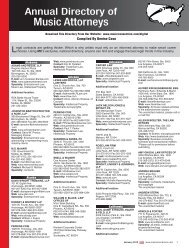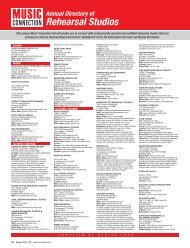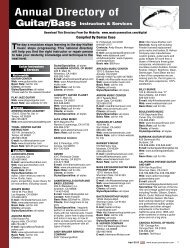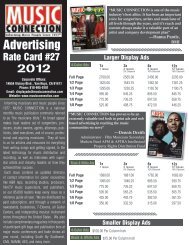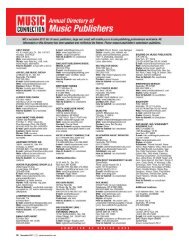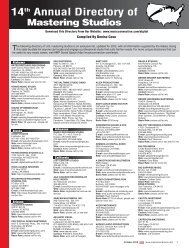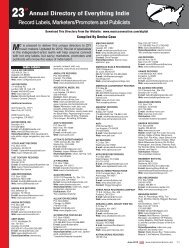CONTENTS
View/Download the new issue PDF here - Music Connection
View/Download the new issue PDF here - Music Connection
- No tags were found...
You also want an ePaper? Increase the reach of your titles
YUMPU automatically turns print PDFs into web optimized ePapers that Google loves.
– DAVID A. BARBER<br />
T<br />
here is a reason why the most successful touring acts bring their<br />
own sound engineer with them. You never know what you’re going<br />
to get. Sound guys (and sometimes gals) run the gamut from terrifically<br />
helpful, to prima-donna assholes. If you’re touring around at the<br />
bar or club level, you’re going be at the mercy of whoever happens to<br />
be working sound board that night. Many of these people have college<br />
degrees in sound engineering, many more are former musicians themselves<br />
and they all have different personalities. If you’re lucky, you’ll get a<br />
pro who takes pride in his work. If you’re not lucky, you may get a tonedeaf<br />
overworked hack who’s nursing a wicked hangover from the night<br />
before––or worse, he may be killing that hangover by getting drunk early.<br />
Either way, you<br />
want to follow a few<br />
simple rules.<br />
<br />
to the sound<br />
engineer (even if<br />
he’s an ass to you).<br />
Treat him like a<br />
highly skilled professional<br />
(even if<br />
he doesn’t act like<br />
one). Do not treat<br />
him like a DJ who’s<br />
never run sound<br />
before and is in<br />
way over his head<br />
(even if he is).<br />
Never Piss-Off the Sound Guy<br />
<br />
that every room is<br />
different and the<br />
sound guy probably<br />
knows better than<br />
you what sounds<br />
right in his room.<br />
No, it won’t sound<br />
the same as it does<br />
in your rehearsal<br />
space––it’s not<br />
supposed to. It’s supposed<br />
to sound better<br />
than that for the audience,<br />
who are listening<br />
through speakers that<br />
are different from the ones that you are.<br />
<br />
you sound great, but if your volumes are wrong on the stage, there’s only<br />
so much he can do. If he asks you to turn your amp down, do it! Then, if<br />
you can’t hear your instrument, ask for him to turn it up in your monitor.<br />
This goes double during sound check (if you’re lucky enough to get one).<br />
ly<br />
take that as an insult. The same is true for going out on the dance floor<br />
or seating area to listen. You are responsible for what comes out of your<br />
instrument, let the sound guy worry about the rest of the room. Never tell<br />
him that it doesn’t sound right in the room, unless it’s a very serious problem.<br />
Overly sensitive sound guys will take this as an insult. Chances are,<br />
the audience will let him know if it’s really bad and obviously his fault.<br />
<br />
are bands scheduled to play after you. There’s only so much time al-<br />
<br />
about it, they may actually ask you to play a little longer to fill in the time.<br />
That’s the best way to be. If you’re the headliner, there’s still a sound<br />
<br />
can go home. Be nice to him.<br />
<br />
bottles, cigarette butts and snack wrappers all over the place. If you<br />
bring it on the stage, take it off with you. That includes the set lists you<br />
taped to the monitor or mic stand, too.<br />
<br />
especially true during sound check (if you get one), but is also okay to<br />
ask for between songs. You need to hear yourself and your bandmates<br />
in order to make<br />
sure you’re playing<br />
or singing right.<br />
Don’t be timid and<br />
then complain that<br />
you couldn’t hear<br />
yourself afterwards.<br />
That just makes<br />
everyone look bad.<br />
<br />
for suggestions.<br />
<br />
some good ones.<br />
Most sound guys<br />
take pride in their<br />
work and want you<br />
to sound as good<br />
as possible.<br />
If you have a<br />
good rapport with<br />
the sound guy,<br />
chances are he<br />
may go out of his<br />
way to make sure<br />
you are happy with<br />
the sound and that<br />
you sound great<br />
out in the room.<br />
We’ve even seen<br />
bands tip the sound<br />
guy, before the set!<br />
That’s not usually<br />
needed, but if you really<br />
want to keep him<br />
happy, an extra $20 isn’t gonna hurt. You might even get him to burn you<br />
a copy of the show afterward. Many sound guys record everything they<br />
mix. This could be a great way to collect material for a live CD or just a<br />
good way to listen to the band performing and get an idea of what does<br />
and doesn’t work or who messed up what parts of the songs during that<br />
performance. It can be a great tool for improving the band overall.<br />
Remember that every stage is different. No two sound systems will<br />
perform exactly alike. No two sound guys will mix you exactly the same<br />
and, most importantly: It will never sound the same as your rehearsal<br />
space. Do what the sound engineer asks and you’ll get the best results<br />
possible for your show. If you don’t cooperate, you run the risk of pissing<br />
him off and then you certainly won’t get his best effort.<br />
<br />
<br />
“Never ever ask the crowd, ‘How does it sound?’<br />
The sound guy will likely take that as an insult.”<br />
while you’re doing that amazing<br />
solo.<br />
If you are unlucky and get a<br />
bad mix, play as well as you can<br />
and hope for the best. That’s<br />
what the seasoned pros do. So<br />
should you.<br />
DAVID A. BARBER is the author of Gigging:<br />
Everything You Need To Know About Playing<br />
Gigs (Except how to play your axe), co-producer<br />
of Band Talk<br />
of RockOnColorado.com, Board Member of the<br />
non-profit Colorado Music Business Organization<br />
and a seasoned professional who has worked at<br />
several Denver area music venues.<br />
78 November 2013<br />
musicconnection.com



